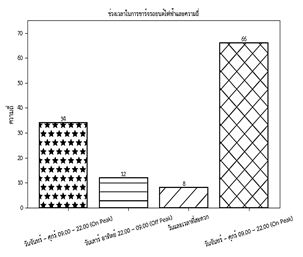ปัจจัยที่มีอิทธิพลต่อการตัดสินใจซื้อรถยนต์ไฟฟ้า: กรณีศึกษาผู้บริโภคในจังหวัดสงขลา
Main Article Content
บทคัดย่อ
การวิจัยนี้มีวัตถุประสงค์เพื่อศึกษาความสัมพันธ์ระหว่างข้อมูลพื้นฐานกับพฤติกรรมการใช้รถยนต์ไฟฟ้าของผู้บริโภค และศึกษาปัจจัยที่ส่งผลต่อการตัดสินใจซื้อรถยนต์ไฟฟ้าในพื้นที่จังหวัดสงขลา กลุ่มตัวอย่างคือผู้ใช้บริการสถานีอัดประจุไฟฟ้า จำนวน 120 ราย (จากแบบสอบถามที่แจกจ่ายทั้งหมด 150 ชุด) โดยเก็บรวบรวมข้อมูลผ่านแบบสอบถาม และวิเคราะห์ข้อมูลโดยใช้สถิติเชิงพรรณนา และสถิติสัมประสิทธิ์สหสัมพันธ์แบบเพียร์สัน ผลการศึกษาพบว่า ผู้ใช้รถยนต์ไฟฟ้าส่วนใหญ่เป็นเพศชาย (คิดเป็นร้อยละ 72.50 ของกลุ่มตัวอย่าง) มีอายุระหว่าง 30-50 ปี (คิดเป็นร้อยละ 53.40) ส่วนใหญ่มีสถานภาพสมรส (ร้อยละ 67.50) การศึกษาอยู่ในระดับปริญญาตรี (ร้อยละ 52.50) ประกอบอาชีพเจ้าของกิจการ/ธุรกิจส่วนตัว (ร้อยละ 42.50) และมีรายได้ 15,000-25,000 บาท (ร้อยละ 43.30) โดยมีเพื่อน/คนใกล้ชิด (ร้อยละ 34.20) และสมาชิกในครอบครัว (ร้อยละ 26.70) เป็นผู้มีอิทธิพลต่อการซื้อรถยนต์ไฟฟ้าซึ่งสอดคล้องกับสมมติฐานที่ว่าบุคคลที่มีความพร้อมด้านการเงิน การศึกษา และมีเครือข่ายทางสังคมที่สนับสนุน จะมีแนวโน้มที่จะซื้อรถยนต์ไฟฟ้ามากกว่า วัตถุประสงค์หลักในการซื้อรถยนต์ไฟฟ้าคือเพื่อความสะดวกในการเดินทางไปทำงาน/เรียน (ร้อยละ 45.80) และผู้ใช้รถยนต์ไฟฟ้ากลุ่มนี้ใช้รถทุกวัน (ร้อยละ 43.30) ส่วนใหญ่มีรถยนต์ไฟฟ้าไม่ใช่คันแรก (ร้อยละ 62.50) และมีรถน้ำมันอยู่แล้ว (ร้อยละ 71.70) แสดงให้เห็นว่ารถยนต์ไฟฟ้าถูกใช้เป็นรถคันที่สองเพื่อการเดินทางในเมืองเป็นหลัก และยังไม่สามารถทดแทนรถยนต์สันดาปภายในได้อย่างสมบูรณ์ โดยผู้ใช้รถยนต์ไฟฟ้ากลุ่มนี้ไม่มีความวิตกกังวลเรื่องค่าใช้จ่าย (ร้อยละ 75.80) และนิยมชาร์จรถในวันและเวลาที่สะดวก (ร้อยละ 55.00) ซึ่งอาจสะท้อนถึงความเพียงพอของโครงสร้างพื้นฐานการชาร์จในปัจจุบัน และการที่ผู้ใช้สามารถบริหารจัดการการชาร์จได้อย่างมีประสิทธิภาพ สำหรับปัจจัยที่มีอิทธิพลต่อการตัดสินใจซื้อพบว่า ปัจจัยด้านการตระหนักในปัญหาสิ่งแวดล้อมส่งผลต่อการตัดสินใจซื้อรถมากที่สุด (โดยมีค่าเฉลี่ยเท่ากับ 4.46 และ ส่วนเบี่ยงเบนมาตรฐานเท่ากับ 0.32) บ่งชี้ว่าผู้บริโภคกลุ่มนี้ให้ความสำคัญกับประเด็นด้านสิ่งแวดล้อม และมองว่ารถยนต์ไฟฟ้าเป็นทางเลือกที่ช่วยลดผลกระทบต่อสิ่งแวดล้อมได้ นอกจากนี้ ยังพบความสัมพันธ์ทางสถิติอย่างมีนัยสำคัญที่ระดับ 0.01 ระหว่างอายุกับวัตถุประสงค์ของการซื้อรถยนต์ไฟฟ้า และพบความสัมพันธ์อย่างมีนัยสำคัญที่ระดับ 0.05 ระหว่างสถานภาพและรายได้กับวัตถุประสงค์ของการซื้อรถยนต์ไฟฟ้า ซึ่งยืนยันว่าปัจจัยด้านอายุ สถานภาพ และรายได้ ล้วนมีอิทธิพลต่อการตัดสินใจซื้อและวัตถุประสงค์ในการใช้รถยนต์ไฟฟ้า
Article Details

อนุญาตภายใต้เงื่อนไข Creative Commons Attribution-NonCommercial-NoDerivatives 4.0 International License.
บทความที่ได้รับตีพิมพ์ในวารสารนี้เป็นลิขสิทธิ์ของคณะเทคโนโลยีอุตสาหกรรม มหาวิทยาลัยราชภัฏนครศรีธรรมราช
อนึ่งผลงานวิจัยและผลงานทางวิชาการที่ปรากฏเผยแพร่ในวารสารฯ เป็นความคิดเห็นอิสระของผู้แต่ง โดยผู้แต่งเป็นผู้รับผิดชอบต่อผลทางกฎหมายใด ๆ ที่อาจจะเกิดขึ้นจากบทความเผยแพร่นั้น ซึ่งกองบรรณาธิการและคณะผู้จัดทำวารสารฯ ไม่จำเป็นต้องเห็นด้วยเสมอไป
เอกสารอ้างอิง
Shang, H., Sun, Y., Huang, D., and Meng, F. 2024. “Life cycle assessment of atmospheric environmental impact on the large-scale promotion of electric vehicles in China,” Resources, Environment and Sustainability. 15(2024): pp. 100148. https://doi.org/ 10.1016/j.resenv.2024.100148
Wang, Y., Jiang, N., and Hong, K. T. 2023. “Research on electric vehicle purchase and sale information management system,” J INFORM SYSTEMS ENG. 8(1): pp. 25395. https://doi.org/10.55267/iadt.07.14510
Ridwan, B. P. P. and Putranto, L. S. 2023. “The Impact of charging time of electric vehicle battery to costumer willingness to purchase,” Journal of Sustainability for Energy. 3(2): pp. 65-74.
Zang, Y., Qian, J., and Jiang, Q. 2022. “Research on the influence mechanism of consumers’ purchase intention of electric vehicles based on perceived endorsement: a case study of Chinese electric vehicle start-ups,” WEVJ. 13(1): pp. 19. https://doi.org/10.3390/wevj13010019
Cahyati, T. and Munandar, D. 2023. “The roles of awareness, interest, evaluation, trial on adoption and its impact on purchase decision: study on new product of "Wuling” electric car consumers in Bandung,” JSI. 6(2): pp. 152–161.
Thananusak, T., Punnakitikashem, P., Tanthasith, S., and Kongarchapatara, B. 2020. “The development of electric vehicle charging stations in Thailand: Policies, Players, and Key Issues (2015–2020),” World Electric Vehicle Journal. 12(1): pp. 2. https://doi.org/10.3390/ wevj12010002
Paudel, A., Pinthurat, W., and Marungsri, B. 2023. “Impact of large-scale electric vehicles’ promotion in Thailand considering energy Mix, peak load, and greenhouse gas emissions,” Smart Cities. 6(5): pp. 2619–2638.
Guo, W., Huang, J., Chen, W., Mao, Y., Atchike, D. W., and Ahmad, M. 2023. “Heterogeneous factors influencing electric vehicle acceptance: application of structural equation modeling,” World Electric Vehicle Journal. 14(5): pp. 125. https://doi.org/10.3390/wevj14050125
Rattanaphan, P. 2016. “Factors affecting the decision of tourists to visit Songkhla province,” Suthiparithat Journal. 30(Special Issue), pp. 168–180. (in Thai).
Sonhaji, S. and Ong, L. 2024. “The influence of incentives, quality, and product availability on attitude toward purchase decision of battery electric vehicle at the greater Jakarta,” SEEIJ. 8(2): pp. 90–103.
Hoang, T. T., Pham, T. H., and Vu, T. M. H. 2022. “Examining customer purchase decision towards battery electric vehicles in Vietnam market: A Combination of Self-Interested and Pro-Environmental Approach,” Cogent Business & Management. 9(1): pp. 2141671-214.
Hoogland, K., Chakraborty, D., and Hardman, S. 2022. “To purchase or lease: investigating the finance decision of plug-in electric vehicle owners in California,” Environmental Research Communications. 4(9): pp. 095005. https://doi.org/10.1088/ 2515-7620/ac8397
Schvartz, M. A., Lange Salvia, A., Londero Brandli, L., Leal Filho, W., and Veiga Avila, L. 2024. “The electric vehicle market in brazil: a systematic literature review of factors influencing purchase decisions,” Sustainability. 16(11): pp. 4594. https://doi.org/10.3390/su16114594
Asawawisidchai, J. and Hansanti, S. 2024. “The influence of Integrated market communication on purchase decision making process of EV car in Bangkok and surrounding areas.,” Proceedings of the International Conference on Applied Research in Management, Business and Economics, 1(1): pp. 1–9. https://doi.org/ 10.33422/icarbme.v1i1.477
Saengwichian, P., Kruta, N., Kamphaengphet, M., and Chamsuk, W. 2021. “Guanxi of Thai-Chinese entrepreneurs influencing to a success for business,” Business Administration and Management Journal Review. 13(2): pp. 378–392.
Buck, S. and Doucette, J. N., 2015. “Transformational leadership practices of CNOs,” Nursing Management. 46(9): pp. 42. https://doi.org/10.1177/0894318417693
Bujang, M. A., Omar, E. D., Foo, D. H. P., and Hon, Y. K. 2024. “Sample size determination for conducting a pilot study to assess reliability of a questionnaire,” Restor Dent Endod. 49(1): pp. e3. https://doi.org/10.5395/rde.2024.49.e3
Srisa-ard, B. 2017. Preliminary research, 10th ed. Bangkok: Suviriyasarn. (in Thai)
Arjarayangkun, S. and Wongsansukcharoen, J. 2022. “Factors affecting decision to use electric vehicle in organization of companies in Chon Buri industrial estate,” Journal of Accountancy and Management. 14(4): pp. 67–83.
Varodomathipat, N. and Lurang, R. 2024. “Model law on the use of electric vehicles in the kingdom of Thailand,” Journal of MCU Social Science Review. 13(6): pp. 1–13. (in Thai)


